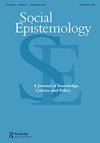Epistemic Autonomy and Intellectual Humility: Mutually Supporting Virtues
IF 2
2区 哲学
Q1 HISTORY & PHILOSOPHY OF SCIENCE
引用次数: 0
Abstract
ABSTRACTRecently, more attention has been paid to the nature and value of the intellectual virtue of epistemic autonomy. One underexplored issue concerns how epistemic autonomy is related to other intellectual virtues. Plausibly, epistemic autonomy is closely related to a number of intellectual virtues like curiosity, inquisitiveness, intellectual perseverance and intellectual courage to name just a few. Here, however, I will examine the relation between epistemic autonomy and intellectual humility. I will argue that epistemic autonomy and intellectual humility bear an interesting relationship to one another in that they are interconnected and mutually supporting intellectual virtues. In Sections 2 and 3 I will provide a brief overview of the predominant accounts of intellectual humility (Section 2) and epistemic autonomy (Section 3) in the literature. With an understanding of these intellectual virtues in hand, we will examine their relationship of mutual support in Section 4. Section 5 will explore a challenge to this relationship coming from the epistemology of disagreement, and Section 6 concludes.KEYWORDS: Intellectual humilityepistemic autonomyintellectual virtuedisagreement Disclosure StatementNo potential conflict of interest was reported by the author(s).Notes1. See Ebels-Duggan (Citation2014), Grasswick (Citation2018), Matheson and Lougheed (Citation2021), Roberts and Wood (Citation2007), and Zagzebski (Citation2013, Citation2015).2. However, see Wright (Citationforthcoming).3. See also Roberts and Cleveland (Citation2016) and Tangney (Citation2009) for similar accounts.4. See also Porter and Schumann (Citation2018).5. Samuelson et al. (Citation2015) have a similar view. They characterize intellectual humility as ‘holding a belief with the merited firmness’ and as ‘believing in accordance with the evidence without claiming to know more (or less) than what the evidence merits’. A somewhat similar view is defended by Alan Hazlett (Citation2012). Hazlett’s view concerns proper meta-beliefs. On his account, intellectual humility is ‘a disposition not to adopt epistemically improper higher-order epistemic attitudes, and to adopt (in the right way, in the right situations) epistemically proper higher-order attitudes’ (220). See also Gregg and Mahadevan (Citation2014) who see intellectual humility as a realistic assessment of one’s epistemic capabilities and Lavelock et al. (Citation2017) who claim that intellectual humility, ‘involves having an accurate view of self, evidenced by honest self-evaluation and willingness to accept one’s strengths and weaknesses’.6. Battaly notes that a deficiency of intellectual interdependence need not come with an excess of epistemic autonomy. Instead, subjects may simply give up on projects whenever it would be appropriate to think with others.7. Nathan King (Citation2021) also gives an account of the virtue of epistemic autonomy along these same lines. According to King, epistemic autonomy requires thinking for oneself while relying on others appropriately (94).8. This follows Matheson (Citation2022a).9. This is not to assume that there is not some sense in which there is a unity of the intellectual virtues. For a helpful discussion of versions of the intellectual unity thesis, see Wilson (Citation2021).10. See Matheson (Citation2022a, Citation2023).11. See Hills (Citation2009), Matheson (Citation2022b) and Zagzebski (Citation2007).12. For more on this point, see Fricker (Citation2006), Goldberg (Citation2021), Nickel (Citation2001) and Nguyen (Citation2018), and Matheson (Citation2022a).13. See Ballantyne (Citation2021, 5–6) and Leary and Terry (Citation2012).14. For an extensive discussion of the relationship between epistemic autonomy, thinking for oneself, and free-riding, see Matheson (Citationforthcoming. The sense of ‘free-riding’ relevant here comes with a desire to not be involved in inquiry even when one is capable of doing so well and has not less of a responsibility than others to put in the intellectual work.15. Alfano et al. (Citation2017, 25).16. See Hannon (Citation2021) and Whitcomb et al. (Citation2017).17. See Ballantyne (Citation2021), Lockheart et al. (Citation2016), and Sloman and Rabb (Citation2016).18. See Matheson (Citation2022b) for more on this point.19. For a summary see Frances and Matheson (Citation2018) and Matheson (Citation2015).20. See also Beebe and Matheson (Citation2022).21. See Enoch (Citation2010), Foley (Citation2001), and Wedgwood (Citation2010).22. While there are perhaps parallel moves that can be made from a steadfast perspective, my focus here will simply be on the conciliatory views.23. Special thanks to Nathan Ballantyne, Heather Battaly, James Beebe, Adam Green, Michael Hannon, Casey Johnson, Jason Kawall, Justin McBrayer, Thi Nguyen, Jamie Watson, Dennis Whitcomb, and Sarah Wright for helpful discussion and comments on versions of this paper.Additional informationFundingThis work was supported by the John Templeton Foundation under grant ID# 61802.Notes on contributorsJonathan MathesonJonathan Matheson is a professor of philosophy at the University of North Florida. His research interests are primarily in epistemology focusing on issues related to disagreement and epistemic autonomy. He is the author of The Epistemic Significance of Disagreement (Palgrave) and Why It’s OK Not to Think for Yourself (Routledge).知识自主与知识谦逊:相互支持的美德
摘要近年来,人们越来越关注知识自主这一智力美德的性质和价值。一个未被充分探讨的问题是认识自主与其他智力美德之间的关系。似乎,认知自主与许多智力美德密切相关,如好奇心、求知欲、智力毅力和智力勇气等等。然而,在这里,我将研究知识自主和知识谦卑之间的关系。我认为,知识自主和知识谦逊之间有着有趣的关系,因为它们相互联系,相互支持知识美德。在第2节和第3节中,我将简要概述文献中关于智力谦卑(第2节)和认知自主(第3节)的主要描述。有了对这些智力美德的理解,我们将在第4节中考察它们之间的相互支持关系。第5节将探讨来自分歧认识论对这种关系的挑战,第6节总结。关键词:知识分子谦逊;自主精神;知识分子美德;意见分歧;参见Ebels-Duggan (Citation2014)、Grasswick (Citation2018)、Matheson and Lougheed (Citation2021)、Roberts and Wood (Citation2007)以及Zagzebski (Citation2013、Citation2015)。然而,参见Wright(引文即将出版)。参见罗伯茨和克利夫兰(Citation2016)以及唐尼(Citation2009)。参见波特和舒曼(Citation2018)。Samuelson等人(Citation2015)也有类似的观点。他们将智力上的谦逊描述为“坚定地持有一种信念”和“根据证据相信,而不声称自己知道的比证据值得知道的更多(或更少)”。Alan Hazlett (Citation2012)也提出了类似的观点。Hazlett的观点涉及适当的元信念。在他看来,智力上的谦逊是“一种不采取认知上不恰当的高阶认知态度的倾向,而采取(以正确的方式,在正确的情况下)认知上适当的高阶态度”(220)。参见Gregg和Mahadevan (Citation2014),他们认为智力上的谦逊是对一个人认知能力的现实评估,以及Lavelock等人(Citation2017),他们声称智力上的谦逊“包括对自我的准确看法,通过诚实的自我评估和接受自己的优缺点的意愿来证明”。巴塔利指出,缺乏知识上的相互依赖并不一定伴随着过度的知识自主。相反,当需要与他人一起思考时,研究对象可能会简单地放弃项目。内森·金(Citation2021)也沿着同样的思路给出了认知自主的美德。根据King的观点,认知自主要求在适当依赖他人的同时自己思考(94)。这是遵循Matheson (Citation2022a)。这并不是说在某种意义上不存在智力美德的统一性。有关知识统一论文版本的有益讨论,请参见Wilson (Citation2021)。11.参见Matheson (Citation2022a, Citation2023)。参见希尔斯(Citation2009)、马西森(Citation2022b)和扎格布斯基(Citation2007)。有关这一点的更多信息,请参见Fricker (Citation2006), Goldberg (Citation2021), Nickel (Citation2001)和Nguyen (Citation2018)以及Matheson (Citation2022a)。参见Ballantyne (Citation2021, 5-6)和Leary and Terry (Citation2012)。关于认知自主、独立思考和搭便车之间关系的广泛讨论,见Matheson(引文即将出版)。与此相关的“搭便车”的感觉是一种不愿参与探究的愿望,即使一个人有能力做得很好,并且不比别人少承担投入智力工作的责任。16. Alfano et al. (citation, 2017,25)。参见Hannon (Citation2021)和Whitcomb等人(Citation2017)。参见Ballantyne (Citation2021)、Lockheart等人(Citation2016)和Sloman and Rabb (Citation2016)。参见Matheson (Citation2022b)了解更多关于这一点的信息。有关摘要,请参阅Frances and Matheson (Citation2018)和Matheson (Citation2015).20。参见Beebe and Matheson (Citation2022)。参见Enoch (Citation2010), Foley (Citation2001)和Wedgwood (Citation2010)。虽然从坚定的角度来看,也许可以采取平行的行动,但我在这里的重点只是和解的观点。特别感谢Nathan Ballantyne, Heather Battaly, James Beebe, Adam Green, Michael Hannon, Casey Johnson, Jason Kawall, Justin McBrayer, Thi Nguyen, Jamie Watson, Dennis Whitcomb和Sarah Wright对本文版本的有益讨论和评论。 本研究由约翰邓普顿基金会资助,资助编号为61802。作者简介jonathan Matheson是北佛罗里达大学的哲学教授。他的研究兴趣主要集中在认识论,关注与分歧和认识论自治有关的问题。他是《分歧的认识论意义》(帕尔格雷夫)和《为什么不独立思考是可以的》(劳特利奇)的作者。
本文章由计算机程序翻译,如有差异,请以英文原文为准。
求助全文
约1分钟内获得全文
求助全文
来源期刊

Social Epistemology
Multiple-
CiteScore
2.60
自引率
17.60%
发文量
60
期刊介绍:
Social Epistemology provides a forum for philosophical and social scientific enquiry that incorporates the work of scholars from a variety of disciplines who share a concern with the production, assessment and validation of knowledge. The journal covers both empirical research into the origination and transmission of knowledge and normative considerations which arise as such research is implemented, serving as a guide for directing contemporary knowledge enterprises. Social Epistemology publishes "exchanges" which are the collective product of several contributors and take the form of critical syntheses, open peer commentaries interviews, applications, provocations, reviews and responses
 求助内容:
求助内容: 应助结果提醒方式:
应助结果提醒方式:


